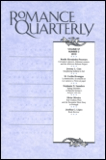
ROMANCE QUARTERLY
Scope & Guideline
Navigating the Landscape of Literary Romance
Introduction
Aims and Scopes
- Gender Studies and Masculinity:
The journal frequently addresses themes of gender and masculinity, particularly in relation to aging, representation, and identity in both literature and audiovisual media. - Cultural and Historical Contextualization:
Papers often analyze literature and cultural artifacts within their historical contexts, exploring how past events shape contemporary narratives and identities. - Interdisciplinary Approaches:
The journal encourages interdisciplinary research, merging literary studies with fields such as history, cultural studies, and gender studies, thus broadening the scope of analysis. - Translation and Adaptation Studies:
There is a consistent focus on translation and adaptation, particularly how literary works cross linguistic and cultural boundaries, impacting reception and interpretation. - Diaspora and Migration Themes:
The journal explores the cultural implications of diaspora and migration, examining how these experiences influence literary production and representation.
Trending and Emerging
- Explorations of Aging and Masculinity:
A significant trend is the exploration of aging and masculinity, particularly how these themes intersect with cultural representation in media, suggesting a growing interest in the complexities of male identity over time. - Cultural Representation and Identity Politics:
Emerging discussions focus on cultural representation and identity politics, particularly regarding marginalized voices and narratives within the Spanish-speaking world. - Digital Humanities and New Media:
There is an increasing engagement with digital humanities and new media, highlighting how technology influences literary production, dissemination, and reception. - Gender Fluidity and Intersectionality:
The journal is increasingly addressing issues of gender fluidity and intersectionality, reflecting broader societal dialogues on identity and representation. - Environmental and Ecological Themes:
Recent publications are showing a growing interest in environmental and ecological themes, particularly how literature engages with ecological crises and sustainability issues.
Declining or Waning
- Traditional Historical Narratives:
There has been a noticeable decline in papers that focus exclusively on traditional historical narratives without connecting them to contemporary issues, suggesting a shift towards more modern interpretations. - Classical Literary Analysis:
The focus on classical literary analysis, particularly regarding works from earlier centuries, seems to be waning as contemporary themes and modern interpretations take precedence. - Static Gender Roles:
The exploration of static gender roles in literature may be declining as the journal increasingly emphasizes fluidity in gender identities and more complex representations. - Regional Studies:
Specific regional studies within the Romance-speaking world appear to be less frequent, indicating a possible shift towards more global or transnational perspectives in literary analysis. - Purely Theoretical Frameworks:
There seems to be a diminishing interest in papers that rely solely on theoretical frameworks without empirical or contextual application, reflecting a preference for more integrated approaches.
Similar Journals

Jordan Journal of Modern Languages & Literature
Elevating Research in Linguistics and Literary TheoryJordan Journal of Modern Languages & Literature is a prestigious academic journal published by Yarmouk University, Deanship of Research & Graduate Studies. This journal serves as a vital platform for scholars and researchers in the fields of linguistics and literature, offering a well-rounded examination of modern languages and literary theory. With an impressive Q2 ranking in Linguistics and Language and a Q1 distinction in Literature and Literary Theory as of 2023, it consistently features high-quality research that contributes to the advancement of knowledge in these domains. The Scopus rankings further reflect its academic rigor, placing it in the 79th percentile for Literature and Literary Theory and maintaining significant influence in related fields, making it an essential resource for researchers, professionals, and students alike. Although it does not operate under an open-access model, the journal's commitment to publishing groundbreaking studies can significantly aid in the understanding and progression of modern linguistic and literary practices. The Jordan Journal of Modern Languages & Literature continues to be an influential voice in fostering scholarly dialogue and advancing research in the humanities.

Anales de Literatura Hispanoamericana
Fostering Dialogue in the World of Hispanic LiteratureAnales de Literatura Hispanoamericana, published by UNIV COMPLUTENSE MADRID, SERVICIO PUBLICACIONES, is a prominent journal dedicated to the field of Hispanic literature and literary theory. With a history of publication spanning from 1996 to 2023, this journal provides an essential platform for scholars and researchers exploring diverse aspects of literature within the Hispanic cultural context. Though it currently operates without an open-access model, its scholarly contributions are vital for advancing the understanding of literary phenomena in Spanish-speaking countries. As a Q3 ranked journal in the Literature and Literary Theory category, it engages a global audience interested in high-quality research, and its Scopus ranking places it among the notable publications in the arts and humanities. The journal aims to foster interdisciplinary dialogue, showcasing innovative research and critical analyses that enhance the appreciation of Hispanic literary heritage. Whether you are a seasoned researcher or an emerging scholar, Anales de Literatura Hispanoamericana serves as a crucial resource for advancing your understanding of the rich tapestry of Hispanic literature.

Estudios Romanicos
Cultivating Academic Discourse Across BordersEstudios Romanicos, published by the Universidad de Murcia, is an esteemed open-access journal that has significantly contributed to the fields of Linguistics, Language, Literature, and Literary Theory since its inception in 1978. With an impact factor that elevates it to Q3 in Linguistics and Language and Q2 in Literature and Literary Theory as of 2023, this journal ranks impressively within its categories—placing it in the 76th percentile for Literature and Literary Theory, making it an essential resource for academic discourse. Based in Murcia, Spain, the journal embraces an open-access model, ensuring that its rich content is accessible to a global audience—fostering collaboration and cross-disciplinary research. The convergence of knowledge from diverse linguistic and literary perspectives allows researchers, professionals, and students alike to engage with cutting-edge scholarship and extend the boundaries of their own studies.

REVUE DES LANGUES ROMANES
Fostering Collaborative Research Across DisciplinesREVUE DES LANGUES ROMANES is an esteemed academic journal published in France, dedicated to the study of Romance languages, linguistics, and literary theory. With an ISSN of 0223-3711, this journal has transitioned to an Open Access model since 2022, broadening accessibility and encouraging collaborative research across disciplines. It serves as a platform for researchers, professionals, and students to explore the intricacies of language and literature within the broader context of arts and humanities. Notably, REVUE DES LANGUES ROMANES has achieved Q4 quartile rankings in 2023 for its contributions to Archaeology, Linguistics, and Literature, reflecting its commitment to fostering scholarly dialogue, despite its emerging status in the academic landscape. With a focus on interdisciplinary approaches, the journal invites innovative insights and critical analyses that further understanding in these fields, promoting the depth and richness of Romance languages and their cultural implications.
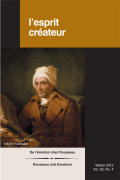
ESPRIT CREATEUR
Redefining Boundaries in Literary AnalysisESPRIT CREATEUR is a prestigious journal published by the Johns Hopkins University Press, renowned for its contributions to the fields of Literature and Literary Theory. Since its inception in 2002, the journal has become a vital platform for innovative scholarly discourse, achieving an impressive Q2 classification in the 2023 category rankings and a respectable rank of #546 out of 1106 in the Scopus Arts and Humanities - Literature and Literary Theory sector, situating it within the 50th percentile of the discipline. The journal's blend of critical perspectives offers readers insights into contemporary literary analysis and theory, making it essential for researchers, professionals, and students alike. Though it currently adheres to traditional access models, its commitment to fostering high-quality, peer-reviewed scholarship cements its status as a leading voice in literary studies, enhancing its role in academic research and education.
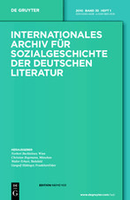
INTERNATIONALES ARCHIV FUR SOZIALGESCHICHTE DER DEUTSCHEN LITERATUR
Exploring the Intersection of Society and LiteratureINTERNATIONALES ARCHIV FÜR SOZIALGESCHICHTE DER DEUTSCHEN LITERATUR is a distinguished academic journal published by Walter de Gruyter GmbH in Germany, dedicated to the exploration of the social history of German literature. With an ISSN of 0340-4528 and an E-ISSN of 1865-9128, the journal has been a valuable resource since its inception in 1976. The journal aims to provide a platform for scholarly discourse, offering insights into the historical contexts that shape literary production and theory. Despite its current quartile rankings of Q4 in both History and Literature and Literary Theory, the journal remains committed to fostering rigorous academic discussion and attracting contributions that stimulate critical engagement within the field. While not currently available as an Open Access publication, it serves as an essential repository of research for historians, literary scholars, and students interested in the nuanced intersection of social history and literature. Located at Genthiner Strasse 13, D-10785 Berlin, Germany, this journal is an indispensable source for anyone seeking to broaden their understanding of German literary scholarship.

REVISTA CHILENA DE LITERATURA
Illuminating the landscape of literary research.REVISTA CHILENA DE LITERATURA, published by Universidad de Chile, Facultad de Filosofía y Humanidades, is a premier open-access journal that has been at the forefront of literary scholarship since its inception in 2004. With its ISSN 0718-2295, the journal focuses on a wide array of topics within the field of literature and literary theory, striving to foster intellectual discourse and innovation. It has gained notable recognition, reflected in its Q2 category ranking in 2023, positioning it among the top journals in its field within the Scopus database, where it ranks #513 out of 1106 journals, placing it in the 53rd percentile. Hailing from Chile, the journal also serves as a vital platform for researchers and students to disseminate their work, enhancing the global dialogue in literature. With a history of convergence from 2007 to 2023, REVISTA CHILENA DE LITERATURA is committed to advancing literary research and its implications in contemporary contexts, making it an essential resource for anyone engaged in literary studies.
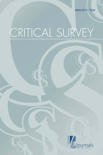
Critical Survey
Navigating the Landscape of Literary AnalysisCritical Survey, published by BERGHAHN JOURNALS, is a distinguished academic journal that focuses on the dynamic intersections of Cultural Studies and Literature and Literary Theory within the arts and humanities landscape. With an ISSN of 0011-1570 and E-ISSN 1752-2293, this journal serves as a crucial platform for scholars, offering original research and critical essays that delve into contemporary cultural and literary debates. Based in the United Kingdom, it enjoys a solid reputation as evidenced by its 2023 Scopus rankings, placing it in the Q3 category for Cultural Studies and Q2 for Literature and Literary Theory. While it does not currently offer open access options, the journal is committed to maintaining high academic standards and fostering intellectual exchange through its published content, inclusive of articles that span a range of topics relevant to critical survey methodologies. As it continues to converge from 2012 to 2024, Critical Survey remains an invaluable resource for researchers, professionals, and students engaged in the evolving discourse of cultural and literary analysis.

Slovenska Literatura
Illuminating the Rich Tapestry of Slovak Literary ThoughtSlovenska Literatura, published by the prestigious SLOVAK ACADEMY OF SCIENCES, INSTITUTE OF SLOVAK LITERATURE, stands as a vital resource in the field of literature and literary theory. With an ISSN of 0037-6973, this journal has attained an impressive Q1 category status in its discipline as of 2023, placing it among the elite literary journals globally. Open access since 2017, Slovenska Literatura provides an inclusive platform for the dissemination of innovative research and critical discussions while fostering scholarly communication across borders. The journal aims to explore the rich tapestry of Slovak literature as well as its interaction with global literary trends, offering insights that are integral for researchers, professionals, and students alike. With its publication base located in Bratislava, Slovakia, it has established itself as an essential point of reference for anyone interested in the complexities of literature, earning its recognition within the Scopus Arts and Humanities ranking. Researchers can delve into its contributions, significantly enriching their understanding of both local and international literary landscapes.
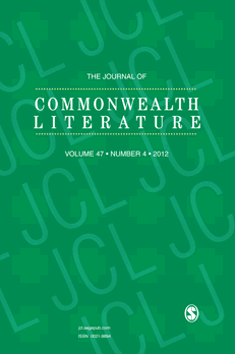
JOURNAL OF COMMONWEALTH LITERATURE
Fostering Critical Insights into Literary LandscapesJOURNAL OF COMMONWEALTH LITERATURE, published by SAGE Publications Ltd, serves as a premier platform for scholarly discourse in the field of Literature and Literary Theory. Established in 1966, this esteemed journal has built a robust reputation, as evidenced by its impressive Q1 ranking in the 2023 category of Literature and Literary Theory and its placement in the impressive 91st percentile among its peers in the Scopus rankings. With an ISSN of 0021-9894 and an E-ISSN of 1741-6442, the journal provides valuable insights into the rich tapestry of Commonwealth literature, exploring diverse works and critical theories that shape our understanding of literature outside the conventional Western canon. While currently not designated as an Open Access journal, it continues to attract a global readership seeking to advance knowledge in this vital area of scholarship. Researchers, professionals, and students alike will find in its pages a rich resource for innovative ideas and critical discussions that reflect the evolving landscape of literary studies.